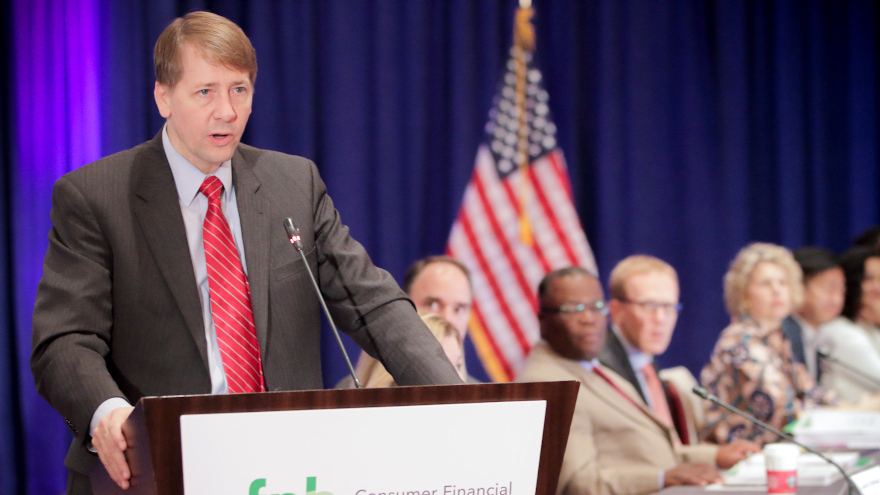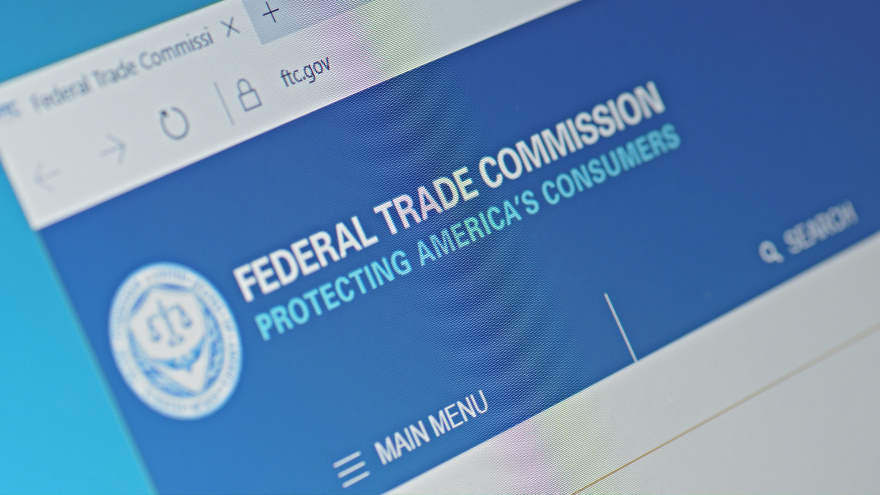The likelihood some contract holders currently in your auto-finance portfolio will seek some kind of payment modification grew again with the latest initial claims for unemployment benefits reported by federal officials on Thursday morning.
For the second week in a row, those initial claims surpassed 6.6 million as the Department of Labor reported that for the week ending Saturday, the advance figure for seasonally adjusted initial claims was 6,606,000, a decrease of 261,000 from the previous week’s revised level. The previous week's level was revised up by 219,000 from 6,648,000 to 6,867,000.
Curt Long, chief economist and vice president of research at the National Association of Federally-Insured Credit Unions (NAFCU), shared his estimate at where the claims figure now leaves the overall employment rate.
“The first week of April saw 6.6 million more initial unemployment insurance claims to bring the 3-week total to nearly 17 million. That figure represents over 10% of the labor force and probably does not capture the true total of unemployed workers,” Long said in a statement on Thursday morning.
“With some states still struggling to process the flood of claims, the unemployment rate now likely exceeds 15%,” he added.
Earlier this week, six federal financial institution regulatory agencies, in consultation with state financial regulators, issued a revised interagency statement encouraging financial institutions to work constructively with borrowers affected by COVID-19 and providing additional information regarding loan modifications.
Officials said their revised statement also provides the agencies’ views on consumer protection considerations.
The agencies explained this revised statement clarifies the interaction between the interagency statement issued on March 22 and the temporary relief provided by Section 4013 of the Coronavirus Aid, Relief, and Economic Security Act, which was signed into law on March 27. Section 4013 allows financial institutions to suspend the requirements to classify certain loan modifications as troubled debt restructurings (TDRs).
Officials went on to note the revised statement also provides supervisory interpretations on past due and nonaccrual regulatory reporting of loan modification programs and regulatory capital. The agencies making these moves via this revised policy include:
—The Federal Reserve System
—Consumer Financial Protection Bureau
—Federal Deposit Insurance Corp.
—National Credit Union Administration
—Office of the Comptroller of the Currency
“The policy challenges are enormous,” S&P Global Ratings chief economist Paul Gruenwald said earlier this week. “Central banks and governments have moved quickly, pulling out all of the stops to keep the financial system functioning as orderly as possible, protect the most vulnerable and highly affected groups and bridge to an eventual recovery.”
Meanwhile, lawmakers on Capitol Hill are reportedly working on additional relief stimulus as initiatives such as the Payroll Protection Program and payments directly to individuals and families continue to be implemented.
“The policy response to the coronavirus pandemic has been massive. We assume that more will follow,” Comerica Bank chief economist Robert Dye said in an analysis posted earlier this week.
Dye added that the spike in unemployment isn’t like to soften quickly even when the general economy generates more activity, noting three elements that might help with potential declines.
“We assume that unemployment benefits are extended, while job creation quickly settles following a relatively short-lived bounce back in hiring,” Dye said.
“Three factors will determine how quickly the unemployment rate falls,” he continued. “One is the rate of post-crisis job creation. The second is the duration of extended unemployment benefits. The third is the retirement patterns of older workers.”
Repossessions and recoveries might be slowing because of the coronavirus pandemic, but Resolvion is still enhancing its services to help auto-finance companies.
This week, the skip-tracing and repossession management company announced the availability of a new service designed to help finance companies manage the flood of deferral/modification requests and, at the same time, better manage the emerging default risk caused by the COVID-19 crisis.
Resolvion highlighted its COVID-19 Risk Manager program involves proactive outreach to a finance company’s highest risk borrowers. Once contact has been established, Resolvion can collect information that is vital for the finance company to assess and manage the current risk.
The questionnaire can be tailored to lender requirements but generally includes:
• Updated address and phone contact information
• Current status of business operations
• Location and condition of collateral
• Current use of the collateral
If desired by the finance company, Resolvion also can advise the customer of options that the lender may make available as a result of COVID-19 disruption of the customer’s business.
In addition to the base service, Resolvion also can provide deep skip tracing, nationwide collateral verification services as well as coordinate any voluntary repossession activity that arises from the customer contact.
“One of the biggest challenges we see lenders facing in this crisis is navigating the need to support customers in need with the requirement to prudently manage portfolio risk,” Resolvion chief executive officer Michael Levison said in a news release.
“We think that the COVID19 Risk Manager program provides a powerful set of tools to lenders to help meet the challenge,” Levison said.
More information about the COVID-19 Risk Manager program can be found at www.resolvion.com.
TCN is looking to give firms equipment they need to stay operational as many of their employees work from home or other remote locations.
The provider of cloud contact center technology for enterprises, contact centers and collection agencies worldwide, recently announced the company is offering complimentary outbound communication tools to all current customers and non-customers. In light of the coronavirus pandemic, TCN said it is equipping companies with the communication tools necessary to connect, update, alert and engage with employees and customers around the globe.
“Leveraging the power of the TCN cloud system, at-home agents can be easily and securely set up via a web browser with no hassle or contract,” TCN co-founder and chief executive officer Terrel Bird said in a news release.
“During these trying times, TCN remains steadfast and committed to empowering companies with advanced, cloud-based, omnichannel contact center tools that will keep employers, employees and customers connected and engaged while working from home,” Bird continued.
Available now, all existing customers and non-customers will have unrestricted access to the below TCN features and services:
— Free immediate setup (for at-home use)
— Free IVR setup
— Free voice recordings
— Free outbound notifications to employees via TCN Notify (email, SMS, voice)
TCN Notify can enable customers to connect with anyone, anywhere, anytime through TCN’s comprehensive, cloud-based contact center platform. With no hardware or software purchases necessary, TCN Notify can offer a range of easy-to-use features for companies to stay in touch with their employees and/or customers via SMS text, email, or voice call with built-in real-time reporting.
To take advantage of this offer or to learn more, call TCN directly at (866) 745-1900 or visit TCN’s Alternative Solutions for Working From Home COVID-19 website available here.
Richard Cordray, the first director of the Consumer Financial Protection Bureau, posted what he called a white paper containing 16 points of action the CFPB should take during the COVID-19 crisis.
In one of those specific points, Cordray directly addressed repossessions in the composition that resembled a letter or email message to current CPFB director Kathleen Kraninger with courtesy copies specified for the chair and ranking members of the U.S. House Financial Services Committee as well as the U.S. Senate Banking Committee.
When he arrived at point No. 9 that focused on vehicle repossessions, Cordray wrote:
There is an entire industry whose business is repossessing automobiles. Close efforts to police those companies are especially important for those consumers facing possible repossession of their vehicles. In much of the country, this is the only lifeline many families have: to get to work, to secure food, or to be able to access emergency medical care. The CFPB should lead an effort to work with Congress on putting in place a moratorium on auto repossessions for the duration of the crisis and its economic aftermath. It should also take steps to ensure that consumers facing possible repossession of their vehicles are informed, treated fairly, and have the remaining equity in their car or truck fully applied to the balance of their loan.
And joining Cordray in compiling the material was Diane Thompson, former CFPB deputy assistant director of regulations, and Christopher Peterson, former special advisor at the CFPB and Department of Defense.
The post available here also called for more oversight of debt collectors:
As more indebted consumers begin to face delinquency and default, there will be more scope for harassment and abuses by some debt collectors. This is especially true as borrowers find it more difficult to repay their loans, and debt collectors find it harder to get compensated for debts they are unable to collect. The CFPB and state officials can issue guidance reminding debt collectors that the Fair Debt Collection Practices Act prohibits any conduct “the natural consequence of which is to harass, oppress or abuse any person in connection with the collection of a debt” or any conduct that is “unfair or unconscionable.” The CFPB should issue guidance about what parameters debt collectors should observe in the current crisis to avoid engaging in conduct that is abusive or unconscionable, such as refraining from initiating new debt-collection lawsuits, garnishing wages, or attaching bank accounts. The CFPB must also ensure that contracted debt collectors abide by all the terms newly set by the original lenders for loan modifications or payment forbearance to deal with the crisis.
Cordray closed the 2,700-word message with this suggestion:
There is much important work to do here, and it demands the CFPB’s urgent focus. The economic crisis emerging in this country creates enormous and unavoidable problems and risks for many consumers. It is in difficult times that strong consumer protections are needed the most. The CFPB is well-positioned to make a difference for large numbers of Americans, but it must confront the circumstances and act immediately to mitigate the harmful effects of this crisis. Those with oversight of the CFPB, including the American public, must make sure this happens.
The Federal Trade Commission reported that just like cases of individuals being diagnosed as positive for the coronavirus is rising significantly, the regulator is noticing steady climbs in COVID-19-connected consumer complaints, too.
As of Sunday, the FTC reported 11,762 complaints, resulting in $8.39 million worth of fraud being committed since the beginning of the year.
The category leading the way in complaints was not auto finance, nor another segment of financial services. Rather, officials categorized travel and vacation fraud being the leader with 1,984 complaints with the average amount of fraud connected to each one coming in at $3,114.
In the financial-services arena, the FTC’s data showed the most complaints were connected with mortgages (395) and credit cards (390).
Over the weekend, MBSi Corp. shared another offering to help its recovery industry customers navigate through coronavirus pandemic.
Agero, the parent company of the Automotive Intelligence Council member, is orchestrating a webinar to help small businesses understand the CARES Act and how the resources of the Payroll Protection Program (PPP) can be beneficial.
The featured speaker will be Agero chief legal officer Peter Necheles, who is scheduled to begin his presentation at 3:30 p.m. ET on Wednesday.
MBSi customers can register for the free webinar here.
National Automotive Finance Association president Joel Kennedy joined senior editor Nick Zulovich for another episode of the podcast this week to share an update on how finance companies are navigating through the coronavirus pandemic.
Kennedy, who also is the chief operating officer of Emerging 8 honoree TruDecision, reinforced the positive outlook he and the NAF Association have for the long-term prospects of the auto-finance industry once the crisis subsides.
To listen to this episode, click on the link available below, or visit the Auto Remarketing Podcast page.
Download and subscribe to the Auto Remarketing Podcast on iTunes or on Google Play.
The Consumer Financial Protection Bureau addressed a crucial element of financial services thrown into a tailspin because of the COVID-19 pandemic.
On Wednesday, the CFPB released a policy statement outlining the responsibility of credit reporting companies and furnishers during the crisis. In response to the pandemic, the bureau acknowledged many lenders and finance companies are being flexible when it comes to consumers’ making payments.
The bureau said its statement underscores that consumers benefit if lenders and finance companies report accurate information about these arrangements to credit bureaus, so that the credit reports of consumers are accurate.
“During this time of uncertainty, we are providing clarity to ensure the consumer reporting industry can continue to function,” CFPB director Kathleen Kraninger said.
“Consumers rely on their credit report to purchase a new car, their new home or to finance their college education,” Kraninger said. “An effective consumer reporting system is critical in promoting fair and efficient access to credit in the consumer financial services market.”
As lenders and finance companies continue to offer struggling borrowers payment accommodations, Congress last week passed the CARES Act. The act requires lenders and finance companies to report to credit bureaus that consumers are current on their loans if consumers have sought relief from their lenders due to the pandemic.
Officials explained the bureau’s statement informs lenders and finance companies they must comply with the CARES Act. Officials added the bureau’s statement also encourages lenders and finance companies to continue to voluntarily provide payment relief to consumers and to report accurate information to credit bureaus relating to this relief.
“The continuation of reporting such accurate payment information produces substantial benefits for consumers, users of consumer reports and the economy as a whole,” the CFPB said.
In addition, in response to staffing and resources constraints on lenders and credit bureaus due to the pandemic, officials went on to mention the bureau’s statement also provides flexibility for lenders and credit bureaus in the time they take to investigate disputes.
“The bureau specifically states that it does not intend to cite in an examination or bring an enforcement action against firms who exceed the deadlines to investigate such disputes as long as they make good faith efforts during the pandemic to do so as quickly as possible,” officials said.
The entire policy statement can be viewed here.
As the auto-finance industry adjusted annual percentage rates (APR) on both used- and new-vehicle paper originated in March, the possibility your portfolio contains contract holders who no longer have their job jumped significantly, based on the newest data released by the U.S Department of Labor on Thursday morning.
Labor Department officials said that during the week ending March 28, the advance figure for seasonally adjusted initial claims was 6,648,000, an increase of 3,341,000 from the previous week’s revised level. The figure represents the highest level of seasonally adjusted initial claims in the history of the seasonally adjusted series.
Officials added the previous week’s level was revised up by 24,000 from 3,283,000 to 3,307,000 stemming from the coronavirus pandemic.
“Combined with last week’s initial claims, 10 million Americans have applied for unemployment benefits in two weeks. That is over 6 percent of the labor force. It will be critical to provide assistance not only to those workers, but to their employers, in order to ensure strong labor demand once the worst of the health crisis is past,” said Curt Long, chief economist at the National Association of Federally-Insured Credit Unions (NAFCU).
Secretary of Labor Eugene Scalia also reacted to the record volume of unemployment insurance claims, emphasizing other programs rolled out by the federal government.
“Similar to last week’s unemployment claims numbers, today’s report reflects the sacrifices American workers are making for their families, neighbors and country in order to ‘slow the spread,’” Scalia said. “The administration continues to act quickly to address this impact on American workers. That includes a rule the Labor Department adopted yesterday to implement the paid leave provisions of the Families First Coronavirus Response Act, and the department’s work with the states to make available the enhanced unemployment benefits provided in the CARES Act, which the president signed last week. That legislation also contains significant incentives for businesses to retain workers and continue paying them, which will put businesses and workers in a better position to resume work and re-boot the economy once the virus is contained.”
Containing the virus likely is a goal for all segments of the economy, not just the auto-finance sector. For an industry working to still retail and finance vehicles during the crisis, James Houston emphasized this factor.
“Any program that assures consumers the affordability of the vehicle they are purchasing during uncertain times and gives after-sale support for those who financed their vehicle helps to generate consumer confidence,” said Houston, who is managing director of consumer lending and automotive finance at J.D. Power.
March auto finance data
Edmunds reported the average interest rate for new-vehicle financing rose slightly in March on a sequential basis, but the metric dipped year-over-year.
The annual percentage rate (APR) on new financed vehicles averaged 5.8% in March, compared to 5.6% in February. However, last March, the average stood at 6.4%.
On the used-vehicle side, the average APR on paper originated in March also climbed on a sequential basis, ticking up to 9.1% from 8.3%. Last March, the used average came in at 9.5%.
With an array of automakers and their captives pushing special programs during the crisis, Edmunds data revealed that the share of new-model sales with zero percent finance deals saw a slight uptick in March, constituting 4.7% of new-vehicle purchases compared to 3.6% in February.
“Automakers reacted quickly to the coronavirus crisis with attractive incentive offers and payment programs, but these unfortunately appeared to fall on deaf ears,” Edmunds executive director of insights Jessica Caldwell said.
“Consumers were understandably distracted by the rapidly changing news cycle and changes to everyday life created by shelter-in-place orders, and March sales took a blow,” Caldwell continued.
Edmunds pointed out that amount contracts with APRs of 10% or higher saw a lift in March, constituting 12.8% of sales compared to 10.7% in February. Term lengths also increased in March, surpassing 70 months for the first time on record.
According to Edmunds, the share of borrowers who had a 73- to 84-month term rose to 35.3% in March, compared to 32.8% in February.
“Vehicle purchases made in March — particularly the second half — were likely need-based,” Caldwell said. “These shoppers might not have necessarily qualified for zero percent finance offers but still needed a car in spite of everything else going on in the world.”
More on prices and incentives
ALG, a subsidiary of TrueCar, projected average transaction prices (ATP) on new vehicles to be up 3.2% or $1,108 from a year ago and up 0.6% or $208 from February.
“Before we get too excited that we are not seeing a decline in average transaction prices, along with the steep sales decline, we must bear in mind that the coronavirus pandemic did not truly affect vehicle sales until the middle of March,” said Eric Lyman, chief industry analyst for ALG, a subsidiary of TrueCar.
“Historically, there’s been a strong correlation between consumer confidence and average transaction price,” Lyman continued. “We’re now seeing one of the largest one-month declines in consumer confidence in nearly 50 years. April will provide a much clearer picture of the full impact caused from the Coronavirus.”
ALG projects that U.S. revenue from new-vehicle sales will reach more than $33.5 billion for March, down 40% (based on a non-adjusted daily selling rate) from a year ago and down 31% from last month.
“Given our 41% forecast decline in new-vehicle sales this month, we expect revenue from new-vehicle sales to drop by 40% from a year ago,” said Nick Woolard, director of OEM and affinity partner analytics for TrueCar. “Social distancing mandates will continue for another month, so we expect the sales and revenue declines to continue through April.”
Lyman elaborated on those future sales expectations.
“We continue to emphasize that the decline will translate to deferred sales, not lost sales,” Lyman said. “Vehicles are extensions of the home. When we come out of this period of heightened health and safety awareness from the pandemic, we expect that personal vehicles may even become an alternative for a subset of consumers who previously opted for public transportation.”
Brad Korner, general manager of Cox Automotive Rates and Incentives, dissected the latest moves by automakers and captives. Korner explained that March offers appear to be holding in place for early April for two key reasons:
1. Korner noted OEMs are evaluating consumer activity to offers like 0% interest, waiving first three payments and deferred payment starts
2. He mentioned automakers also are evaluating consumer demand for offers that may include home delivery, electronic contracting and virtual delivery tools.
“With the market and economy impacted by COVID-19, OEMs are changing incentive offers and cadences,” Korner said. “Traditionally, new incentive programs are released the first few days of the month and are held in place for the most part through the month-end. However, with COVID-19 ravaging the economy, roughly two-thirds of brands reacted with new offers midway through March in an effort to slow rapidly falling sales.
“It is likely we will see weekly OEM incentive offers remain fluid as a reflection of shopper activity and feedback,” he added.
New-Vehicle Finance Data
|
|
March 2020
|
March 2019
|
March 2015
|
|
Term
|
70.6
|
69.6
|
67.6
|
|
Monthly Payment
|
$573
|
$553
|
$489
|
|
Amount Financed
|
$34,052
|
$31,962
|
$28,592
|
|
APR
|
5.8%
|
6.4%
|
4.8%
|
|
Down Payment
|
$4,008
|
$4,217
|
$3,508
|
Used-Vehicle Finance Data
|
|
March 2020
|
March 2019
|
March 2015
|
|
Term
|
67.8
|
67.6
|
66.1
|
|
Monthly Payment
|
$412
|
$406
|
$377
|
|
Amount Financed
|
$22,155
|
$21,524
|
$20,347
|
|
APR
|
9.1%
|
9.5%
|
8.2%
|
|
Down Payment
|
$2,643
|
$2,715
|
$2,410
|
Source: Edmunds
Financial-services providers want to reach their customers to inform them about products and programs that can be beneficial during the coronavirus pandemic, and they’re asking for help from the Federal Communications Commission (FCC) to clear a regulatory path.
This week, seven industry trade associations compiled a 23-page petition to the FCC requesting an immediate ruling, clarification or waiver regarding parts of the Telephone Consumer Protection Act (TCPA). The crux of their petition stemmed from the use of the regulator’s Emergency Purposes Exception.
The petition explained an exception could allow phone calls and text messages placed by banks, credit unions, and other customer-facing financial services providers using an automatic telephone dialing system or prerecorded or artificial voice on matters related to the COVID-19 pandemic are “call(s) made for emergency purposes,” and could be placed without the consent of the called party.
The petition emphasized that companies would use this exception to:
— Offer payment deferrals, fee waivers, extension of repayment terms, or other delays in payment, modification or forbearance on mortgage payments or other loans
— Advise consumers of branch closings, service limitations, reduced hours, or the availability of remote banking or other remote access options
— Warn consumers of potential fraud on the consumer’s account
— Make consumers aware of programs, relief and resources offered by the institution in response to the pandemic
The associations stressed the calls they seek to place under the Emergency Purposes Exception are solely informational calls made in good faith to assist consumers and do not include calls that contain advertising or telemarketing or seek to collect payment on a debt.
The associations also reminded the FCC that on March 20, the commission confirmed that the COVID-19 pandemic constitutes an emergency under the TCPA.
Included in the effort were:
— American Bankers Association (ABA)
— American Financial Services Association (AFSA)
— Consumer Bankers Association (CBA)
— Credit Union National Association (CUNA)
— Independent Community Bankers of America (ICBA)
— Mortgage Bankers Association (MBA)
— National Association of Federally-Insured Credit Unions (NAFCU)
“These time-sensitive calls must be placed using automated means. Manual dialing does not achieve timely notification of consumers,” the associations said in the petition. “The calls that banks, credit unions, and other customer-facing financial institutions seek to place on matters related to the pandemic are intended to protect or support the financial health or safety of consumers.
“Constructive engagement with consumers is best achieved by proactive outreach communication by the institution through phone calls and text messages,” they continued.
“The associations urge the commission to ensure that these communications may be freely made by confirming that calls and text messages placed by financial institutions related to COVID-19 are calls made for emergency purposes, or by granting a temporary waiver of the commission’s definition of ‘emergency purposes,’ adopted through regulation, to allow these calls related to this national emergency,” the associations went on to say.
The entire petition can be reviewed on this website.












